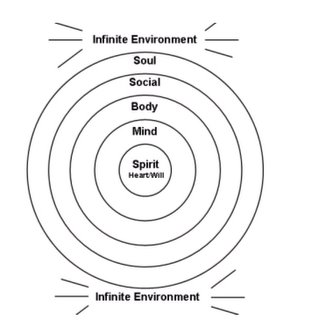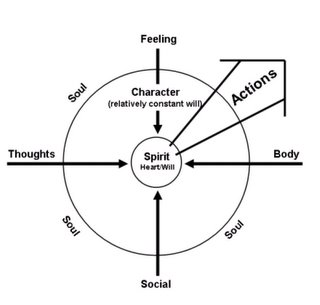Character Renovation Part 2 (First Half)
Character Renovation Part 2
So far we have learnt that our behaviors stem from the type of people that we are. If you are a person thats gets angry, you are an angry person, and if you are a person that avoids certain people you are the type of person that rejects people.
Because our behaviors stem from our character, and trying to change our character trough behavior is nearly impossible, what are we to do?
There are two models we will look at.
The first model comes from Dallas Willard, a very well respected philosopher, and how he depicts the human make-up.
None of us want to be liars, lazy or angry people, yet we find oursleves displaying those types of behaviors. Since none of us want to be those kinds of people, and yet we still are, Dallas Willard advocates that factors other than your will come into play in your behavior.

Our Spirit is the center of us, our most intimate part of us, this is where the majority of our decisions stem from.
Our Mind is the next factor we influence our decisons with. These are our thoughts and feelings. Think of the thought as the message, and feelings as its tone.
Our Body, it is the influence of physical addictions, handicaps, stress and also strenght, endurance, tastes in foods, habits and so on.
Our Social influence. This is who we "know" ourselves to be in relationship to others. Since we are in an individualistic secular, and modern society, this likely includes a predisposition toward feeling isolated, and anticipation of rejection and an assumption that we are seperated from God.
Our Soul, This is the entirety of our inner being. This is what others bump into when they meet us.
The 'infinite environment is where we interact with others and God.
Two things are interesting and worth noting.
Our Soul as the total of us, and not some deep part of us. This is a new idea for the majority of us. This also resembles a lot of what people would call an aura these days.
Our Spirit supercedes the mind as a core. Our thoughts and feelings are largely a matter of choice stemming from our spirit. Most people don't recognize that.
To give an example of how this affects common decisons..
If you are hungry, the issue of what to eat will be decided by your character.
If you immediately think, “I feel like chicken” then it is coming from your mind/feeling center.
If you don’t think about it, but reach for the food that you always reach for, then it’s coming from your body.
If you eat what everyone else eats, or neglect to eat because of your view of yourself, then it’s coming from the social center.
At any time though, you can make a conscious choice to eat something totally random, or nothing at all as you may be fasting, these decisions come from the spirit/will.

Our actions proceed from our spirit/will, through our character, then reveal themselves first in our souls before interacting with the world around us. So how do you change your behavior?
Change your spirit, your will, your heart, your character.
There are two models for this, both are entirely Biblical.
Dallas Willard advocates bombardment. Bombard yourself with images, words, thoughts (which you choose to have), symbols, people, experiences, generally outside influences that feed into the kind of character you like.
Do you want to be loving, hang out with loving people.
Do you want to be generous, put pictures of poverty around your house.
Do you want to be healthy, don’t put pictures of skinny people up, put food labels up around your mirror, buy running shoes, talk to people you consider healthy about being healthy.
Do you want to be a great leader, read the stories of Joshua, Peter, Jesus, Theresa of Avila, Martin Luther King, Mother Theresa, etc.
Above all, PRAY!!! Jesus is the only one that has direct access to your spirit, and can change it without having to deal much with your other character influences.
Change your character by changing your influences.
(Note: For more information and source check out Dallas Willard book, Renovation of the Heart)
We will look at the other model in the second half of this teaching.

0 Comments:
Post a Comment
<< Home